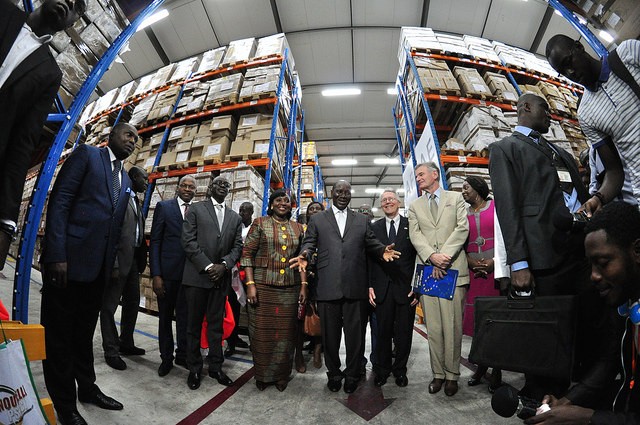Home » News & Information » Fact Sheets » Improving HIV/TB care in Côte d'Ivoire through better management—and a little inspiration

USAID and the Global Fund's new modern warehouse for medicines and commodities
Micah Clemens USAID Côte d'Ivoire
When HIV treatment lapses, opportunistic infections and illnesses can arise, posing a real threat to patients' health. Tuberculosis (TB) is one such infection and the fifth most common cause of death in Côte d'Ivoire. While all health facilities treating HIV and AIDS patients in Côte d'Ivoire should also regularly screen for TB, this is often not the case due to a lack of resources.
The Prikro General Hospital was one such health facility; under-financed and lacking sufficient facilities, it was forced to refer patients to the Daoukro district hospital, 72 km away, for TB screening and treatment.
The Prikro General hospital was one of 11 health teams participating in the Leadership Development Program Plus (LDP+), a program developed by Management Sciences for Health (MSH) and implemented by the USAID-funded Leadership, Management and Governance Decentralization Pilot Project (LMG/CIDMP). USAID’s LDP+ program is a six- to eight-month process that guides a team through identifying a challenge, devising an action plan, addressing the challenge, then measuring progress. After the Prikro team successfully increased the number of patients on antiretroviral therapy (ART) who adhere to their treatment plan, the team members then applied the LDP+ concepts to improve screening for HIV/TB co-infections.
Dr. Djah Beugré, Director of Prikro’s General Hospital, focused on the challenge of establishing TB screening on site, despite the limited laboratory space available (10 m²) on hospital grounds. He aligned his team around this shared vision, arranging for two staff members to participate in training at the Abengourou Antituberculosis Center.
These staff then solved the space issue by a simple, inspired solution: spreading sputum samples to dry in a secure location in the hospital courtyard—and using lab space only to analyze them. As a result, the Prikro hospital now has the capacity to screen and treat HIV/TB co-infected patients, who no longer have to travel to Daoukro for care.
As Dr. Djah Beugré, explained, “this solution would not have occurred to us, and we would not have a functional TB screening and treatment center so soon, if we had not learned the practices introduced in USAID’s LDP+ program. They teach us that we can overcome the greatest challenges with few resources... especially for the well-being of our people.''







Comment
Make a general inquiry or suggest an improvement.